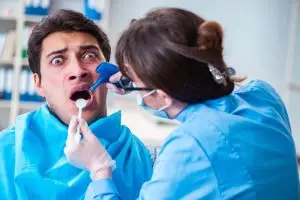Sedation dentistry has gained popularity in the last few years for many reasons. While those who are terrified of the dentist have benefited greatly, other groups of people may benefit from “sleep dentistry.” Dentists offer several options to help patients relax during a procedure. No matter which method you choose, there are many benefits to using sedation.
Reduced Anxiety
 Dental appointments trigger fears in many people. A past painful appointment left the patient traumatized; or the idea of lying helplessly while a dentist performs painful procedures is overwhelming. Many patients neglect their dental health because of the overwhelming anxiety that these appointments cause. Sedation dentistry allows nervous patients to receive dental care without experiencing panic attacks, nausea, and other unpleasant feelings.
Dental appointments trigger fears in many people. A past painful appointment left the patient traumatized; or the idea of lying helplessly while a dentist performs painful procedures is overwhelming. Many patients neglect their dental health because of the overwhelming anxiety that these appointments cause. Sedation dentistry allows nervous patients to receive dental care without experiencing panic attacks, nausea, and other unpleasant feelings.
Multiple Procedures Needed
It happens. You procrastinate about making a dental appointment, life gets busy, and before you know it, it has been a long time since you’ve seen the dentist. Sometimes this works out okay, but for others, the first appointment at the dentist in a long time reveals a need for several dental procedures. Often, dentists recommend multiple appointments. Dentists feel that having too many procedures at once will be too stressful. However, sedation dentistry can change all of that and make it possible to have multiple procedures at once.
People with Special Needs
 Sedation dentistry is a gift for those who have special needs and the people who care for them. When people have autism, mental disabilities, or dementia, they may not be able to understand what is happening in a dental procedure. They may struggle to understand basic instructions or may even fight against the dentist in a traditional appointment. Dental sedation is perfect for these kinds of situations. Be sure to let the dentist know that your patient has special needs before the appointment.
Sedation dentistry is a gift for those who have special needs and the people who care for them. When people have autism, mental disabilities, or dementia, they may not be able to understand what is happening in a dental procedure. They may struggle to understand basic instructions or may even fight against the dentist in a traditional appointment. Dental sedation is perfect for these kinds of situations. Be sure to let the dentist know that your patient has special needs before the appointment.
Minimizing the Gag Reflex
Many people find dental appointments quite unpleasant because they have a very strong gag reflex. They spend the entire appointment trying not to vomit on their dentist, an event that would feel terrible and be completely humiliating. Dental sedation helps reduces a strong gag reflex so you and your dentist can make it through the appointment. The medications given to relax the patient will also relax the muscles that cause a gag reflex.
Types of Sedation
 Not all types of dental sedation are appropriate for every situation. That is why patients need to attend an initial consultation with the dentist. They’ll take a quick peek to see what dental issues are present, talk about what medical problems the patient has, and together determine the level of sedation that is appropriate for you. Dentists offer four basic types of dental sedation.
Not all types of dental sedation are appropriate for every situation. That is why patients need to attend an initial consultation with the dentist. They’ll take a quick peek to see what dental issues are present, talk about what medical problems the patient has, and together determine the level of sedation that is appropriate for you. Dentists offer four basic types of dental sedation.
- Oral sedation: In oral sedation, the dentist prescribes a pill for the patient to take before the procedure. These pills don’t completely put you to sleep but provide a “conscious sedation” experience so that you feel relaxed and calm for the dental work. You will need a person to drive you to and from the dental appointment with oral sedation.
- Nitrous oxide: Nitrous oxide is also called laughing gas. Patients inhale the gas at the dentist office, and it provides varying levels of sedation. Nitrous oxide wears off fairly quickly, so patients can often drive themselves home from the appointment.
- IV sedation: IV sedation delivers drugs to the patient intravenously to help you relax and sleep through an entire procedure. Certain medications cause a kind of “twilight sleep” where you can respond to questions and be semi-awake through the procedure but will have no memory of what occurred during the appointment. Generally, patients can’t drive after IV sedation procedures.
- General anesthesia: General anesthesia often takes place in the hospital because it carries specific risks, like a drop in blood pressure. Patients will have no memory at all of dental procedures performed under general anesthesia.
Conclusion
If you are looking for dental sedation in Mesa, call Dental Brothers. Whether your situation requires nitrous oxide, IV sedation, or oral sedation, we have the expertise to provide the exact level of sedation for you and your dental procedures. We’ll set up a consultation to determine what procedures need to be done, how long the procedures will take, and which form of sedation is appropriate.
